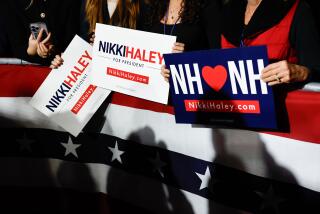Buchanan Uses Whatever It Takes in Long-Shot Bid : Campaign: By turns biting and charming, the GOP candidate seems a willing magnet for controversy.
- Share via
MANCHESTER, N. H. — Patrick J. Buchanan clambered onto a truck bed in his elegant suit the other day and pulled the switch powering a massive searchlight. It scanned the skies over a down-at-the-heels former mill yard.
“Where’s George?” the conservative Republican presidential candidate taunted, his gaze following the beam of light into the empty darkness.
As Buchanan well knew, George--President Bush--was half a world away on a Far East mission that Buchanan had been criticizing all day before topping off his rhetoric with this visual flourish.
“It’s like the old Batman signal,” explained a Buchanan aide. “When Gotham City was in trouble, they called for Batman.”
A few Buchanan supporters took up the chant: “Patman! Patman!”
Five weeks away from the Feb. 18 New Hampshire primary, Pat Buchanan is using whatever it takes, from searchlights to more conventional political tactics, in what even he describes as a “long, long, long shot” bid to wrest the presidency from the grasp of his fellow Republican Bush.
Shaking hands in a grocery in Plymouth, touring an icy lumberyard in Rumney, fingering a newly constructed .44-caliber pistol in a gun factory in Newport--”Go ahead, make my day,” he said as he pulled the trigger--Buchanan is virtually ever-present in New Hampshire these days.
He can be biting, courtly, insulting, even charming, a onetime boxer who still exults at landing a body blow. At times, it appears that the state has been invited to be on one of those contentious cable television shows on which Buchanan, 53, gained fame before his Dec. 10 announcement for the presidency.
Controversy seems to swirl around him and much of it is self-inflicted, centering on his statements about race and ethnicity.
One night last week, after Buchanan strode into a Dartmouth College auditorium filled with several hundred students, someone derisively yelled “Zulus!” The reference, which drew noticeable applause from some members of the audience, was to Buchanan’s suggestion last December that the immigration of “Englishmen” rather than “Zulus” would “cause less problems for the people of Virginia,” where he lives.
Undeterred by the outcry, Buchanan proceeded to pepper his remarks at Dartmouth with several racial references that many members of the crowd clearly found offensive.
He sniped at Jack Kemp, a fellow conservative who ran against Bush for the Republican presidential nomination in 1988. Kemp, now Bush’s secretary of housing and urban development, has argued for the empowerment of the poor and minorities.
“Jack has gone native on us,” Buchanan told the students. “He’s down there wearing native garb.”
Later, in a scalding denunciation of foreign aid, he called senior Chinese leader Deng Xiaoping “an 85-year-old chain-smoking Communist dwarf.”
Asked by a student whether he meant to prey on racial fears, Buchanan responded: “I don’t find anything wrong with humor.”
In an interview, Buchanan denied that he is racist--or, as others have charged, anti-Semitic. At the same time, he said he has grave concerns about the presence of various ethnic groups in America and said those who refuse to “assimilate” pose a threat to the United States.
“We are a particular kind of country. We speak the English language,” he said, adding, “all I’m saying is that while God may have--did make--all people good . . . we’re not able to assimilate all peoples at the same rate.”
” . . . My view is, I am against quotas. I am against court-ordered busing. I am against the government trying to rearrange communities into some racial grid. I believe in freedom of association. If people don’t like it, they don’t like it.”
Much of his criticism was aimed at Latinos.
“There’s a demand by many, or some, Hispanics to retain Spanish as a separate language and to require it in various places . . . “ he said.
“People used to come here to become Americans . . . but a lot of folks are coming now, in the Southwest, coming to get the benefits of the welfare state,” he added.
During his campaign stops, Buchanan rarely volunteers such comments. In this state, which is overwhelmingly white and whose Republicans are conservative, voters have gone along with Buchanan’s attempt to keep his focus squarely on George Bush and the foundering economy.
Buchanan is drilling Bush for what he considers the President’s greatest sins--abandoning his pledge not to raise taxes and failing to devise an economic-recovery plan.
Buchanan also overtly plays on Bush’s frequent overseas travel, suggesting that the President has abandoned Americans. It is a message meant to strike a particularly strong chord in New Hampshire, whose first-in-the-nation primary resurrected Bush’s 1988 campaign after an embarrassing third-place finish in the Iowa caucuses.
“Thousands and thousands of jobs have been lost here,” Buchanan told supporters gathered recently at the former mill yard in Manchester.
“Mr. Bush has got to start looking out for America first.”
When asked what he would do as President, however, Buchanan offers only a few general statements. Under the rubric “America first,” he calls for sharp cutbacks in spending overseas--for defense and other foreign aid--and at home. He says he would cut taxes on the middle class, on savings and on investments.
Only rarely, usually in response to questions, will Buchanan enter the minefield of domestic concerns through which other presidential candidates warily tread--issues like health care, education, crime, homelessness or drugs.
At virtually every stop, for example, Buchanan is asked what he would do to ensure better medical care for Americans. Once, he hinted that he favors tax credits to pay for health insurance, and several times he said he opposes national health insurance. Other than that, he told voters to stay tuned this week, when he expects to begin sketching in details.
The lack of specifics on that and other subjects prompted a tart exchange as Buchanan greeted prospective supporters in tiny Plymouth.
“You’ve got a lot of homework to do, don’t you?” needled Ann Smith of nearby Ashland.
“Yes, I’ve got a lot of homework to do, and so does Bush--and he has to come home to do his homework,” Buchanan retorted.
It is hard to tell at this stage whether Buchanan’s campaign is generating momentum or merely attention. Although there is little doubt that voters in New Hampshire are discontented, it remains to be seen whether they will give him enough votes to embarrass or, less likely, to beat Bush.
Buchanan’s sister and campaign chairwoman, Angela (Bay) Buchanan, said it would be a “breakthrough” if her brother won more than 30% of the New Hampshire vote. But the candidate himself refused to speculate on the election.
In New Hampshire, Buchanan has picked up support primarily from those who in 1988 backed two Bush alternatives, Kemp and religious broadcaster Pat Robertson. Angela Buchanan, an unsuccessful candidate for California state treasurer in 1990, said the campaign has raised $750,000 and is aiming at $3 million, which it plans to spend mostly in the Northeast.
There is little sign, however, that Buchanan is well organized in any of the states whose primaries follow New Hampshire’s. Although he has worked in the Richard M. Nixon, Gerard R. Ford and Ronald Reagan administrations, Buchanan has never before run for office. And, in addition to the enormous difficulties faced by any late-starting campaign, Buchanan’s effort has lost its national pollster and strategist, Tony Fabrizio, who tossed in the towel earlier this month after disagreements with the candidate and his sister. On Monday, Buchanan named Frank I. Luntz as his pollster and Ian and Betsy Weinschel as his media consultants.
But, as Buchanan knows, his fate rests not with strategists and influential Republicans but with voters. Last Thursday, his hopes skyrocketed during a series of stops at businesses in the central and northwest part of the state, hit hard by recession for three years.
Egged on by Buchanan’s questioning, normally taciturn New Hampshirites vented anger at Bush, blaming him for the fear that has pervaded their communities.
“The Japanese, Chinese, Koreans, Germans--we’ve supported them so long, now they want everything and we’re putting out everything and we’re getting nothing in return,” said Jim Lavigne Sr., a 47-year-old inspector at the Sturm, Ruger & Co. gun plant in Newport, where Buchanan visited.
“What you’re saying is we ought to start looking at America and our own problems,” Buchanan told him, nodding. “America first.”
More to Read
Get the L.A. Times Politics newsletter
Deeply reported insights into legislation, politics and policy from Sacramento, Washington and beyond. In your inbox twice per week.
You may occasionally receive promotional content from the Los Angeles Times.











